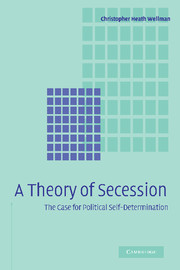Book contents
7 - Secession and International Law
Published online by Cambridge University Press: 18 July 2009
Summary
This chapter explores the wisdom of reforming the international legal system's stance on state breaking in light of the moral rights validated by the functional theory of secession. This matter cannot be settled conclusively without empirical information that is currently unavailable, but I argue both (1) that the case in favor of the functional theory places the burden of proof on those who would restrict secessionist rights and (2) that there are good reasons to doubt that Remedial Right Only theorists will be able to withstand this burden.
Ideal Theory and International Law
International law's stance on secession is even less permissive than that of contemporary political theory. In the Introduction I mentioned that, while many theorists now acknowledge that a group can have a remedial right to secede when it has suffered severe and long-standing injustice at the hands of its state, most deny that a group could have a unilateral right to political divorce when it has not been treated unjustly. The existing international legal system is more conservative than political theory; not only does it not protect primary rights to secede, it fails to recognize even most remedial rights. Currently, international law invokes a “saltwater” test (restricting secessionist rights to overseas colonies), so it does not recognize Chechnya's right to secede, let alone Scotland's or Quebec's. Thus, clearly it would require a huge transformation to revise the international legal system in accordance with the recommendations of the functional theory of secession.
- Type
- Chapter
- Information
- A Theory of Secession , pp. 157 - 180Publisher: Cambridge University PressPrint publication year: 2005



